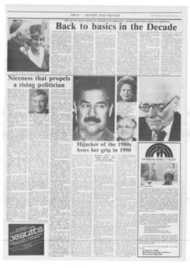Page 4, 28th December 1990
Page 4

Report an error
Noticed an error on this page?If you've noticed an error in this article please click here to report it.
Tags
Share
Related articles
Talks On Sabbath
Sunday Work Opt Out 'inadequate'
Lords Ruling A Victory For `family Life'
Case Against Sunday Trading
Church Wants Action Now On Sunday Trade
The case for Sunday trading
JOHN Major's pledge to re-examine Sunday trading laws in Britain presents a much needed opportunity to sort out legislation which has become confused and, many would say, unworkable.
More shops and chain stores opened for preChristmas shopping this time round than for many years, openly flouting the law and risking fines in the courts. But the paltry nature of the penalties and the haphazard way in which the regulations are enforced encourages businesses to regard the fines as merely an additional expense incurred in keeping their premises open for the seasonal consumer rush. Hamleys, the leading London toy shop, was fined £800 for Sunday opening by Westminster City Council this month, but continued the practice nonetheless, arguing that, apart from the benefit to shoppers, £4,000 was raised for a relief fund in Romania the Sunday before last.
The law in Scotland allows shops to trade on Sundays, without noticeably affecting the quality of life there, and indeed most of the shops do choose to remain closed. We must, in England and Wales, decide whether it is the act of trading on the sabbath that is wrong — or whether the offence is in the selling of certain sorts of goods.
The gift shop in our own Westminster Cathedral is open for business on Sundays, offering goods to the faithful after mass. Can it be said that a shop inside a church is permissable, even if it is operating wholly within the law as it stands today, when to buy dried flowers or a dictionary in the streets outside is not?
Of course one must be sceptical of attempts made by the larger stores to beat the recession in the high street by luring in shoppers on the one day most people do have to themselves. But in most urban areas of England and Wales small corner shops have been operating on Sundays for years, attracting neither the attention of the local councils, whose responsibility it is to control Sunday business activities, or the wrath of local inhabitants.
And how many such corner shops could really be expected to remove goods from their shelves to comply with laws which allow them to sell milk and cream, "including clotted cream whether sold in tins or otherwise" — but not any of those in tinned or dried form?
When a hill to change the law on Sunday trading was last debated in Parliament in 1986, the advocates of reform were soundly defeated by those protesting that the sabbath would be defiled and shop-workers' trades unions anxious not to see their members subjected to unfair working hours.
But the debate must not be allowed to centre on the view of the sabbath held by a vociferous minority who would prefer to turn the clock back to a pre-consumer age, now gone forever.
We must accept that the current laws are not being obeyed, and in order to safeguard Sunday for religious observances and family occasions to the fullest extent possible, all sides in the argument must be brought around the table to thrash out a way ahead. The stores will undoubtedly have a stronger case for outright abolition of the Sunday trading provisions if some acceptance of the existing position is not forthcoming from the observance lobby.
And no-one outside the boardrooms of the retail multiples wants Sunday to lose its special quality and become indistinguishable from any other day.
blog comments powered by Disqus











